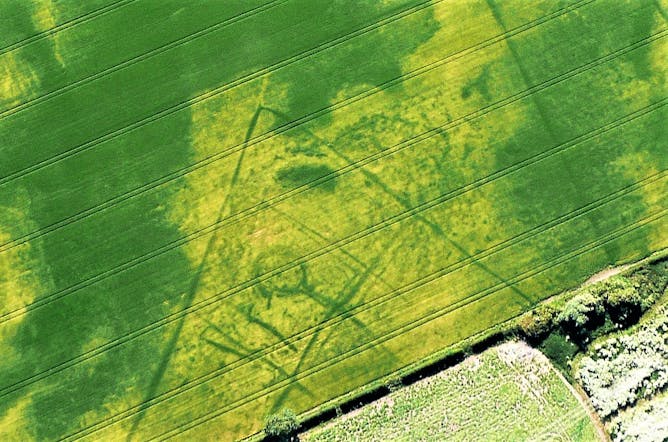|
|
|
Editor's note
|
|
The long hot summer has dried up streams, scorched gardens and kept smiles on faces all over Britain. Among those for whom this summer has been a gift are archaeologists – as the soil dries, cropmarks reveal a hidden harvest of ancient structures outlined in the fields. Aerial archaeologist Peter Halkon explains how to interpret these signs of the past.
When a person of colour with light skin rises rises to prominence, it’s often heralded as a sign that structural barriers to the progress of people of colour have been removed. But Aisha Phoneix warns that colourism – prejudice involving the preferential treatment of people with light skin – means people of colour, particularly women, are burdened with an oppressive ideal of what is “beautiful”.
There are already seven billion people on Earth and limited natural resources to share round. Some say the solution is to curb population growth, but others accuse them of ignoring global inequalities in reproductive rights and resource use. Is it even possible to talk about “overpopulation” and the environment without being insensitive? Rebecca Laycock and David Lam say it is.
|
Michael Parker
Membership Editor
|

|
|
Top stories
|

Unseen from ground level, this Iron Age farmstead with recognisable round house near the Yorkshire Wolds is revealed in cropmarks. The lighter green shows it was carefully placed on a gravel rise surrounded by wetter land, shown here where the crop grows a darker green.
Peter Halkon
Peter Halkon, University of Hull
A hot summer reveals hidden history beneath the dried-out fields - but only when seen from the air.
|

Meghan Markle’s marriage to Prince Harry was portrayed by some as offering ‘hope’ to all people of colour.
Dominic Lipinski/PA Archive
Aisha Phoenix, SOAS, University of London
The racism that underpins colourism must be challenged.
|

Ints Vikmanis / shutterstock
Rebecca Laycock Pedersen, Keele University; David P. M. Lam, Leuphana University
Too often, talk of population and sustainability becomes emotionally loaded and conflict ridden.
|
Business + Economy
|
-
Adam Behr, Newcastle University
Recent developments mean that touting on an industrial scale could become more difficult.
-
Brian Lucey, Trinity College Dublin; Shaen Corbet, Dublin City University
Bitcoin needs regulation to bring it into the mainstream but this goes against its libertarian ideals.
-
Felipe Antunes de Oliveira, University of Sussex
Only a couple of months until the elections, the frontrunner is behind bars and the economic agenda of the next government is anyone’s guess.
|
|
Politics + Society
|
-
John Curtice, Strathclyde University
Results showing a large number of Leave constituencies now back Remain caused great excitement but don't necessarily mean major change is on the way.
-
Rosa Freedman, University of Reading; Aoife O'Donoghue, Durham University
While his appointment as UN Secretary-General was a huge breakthrough, Kofi Annan also led the organisation through some of its ugliest moments.
-
Sofia Tipaldou, University of Manchester; Katrin Uba, Uppsala University
As we try to understand how extreme groups win mass appeal, this organisation offers valuable lessons.
|
|
Science + Technology
|
-
Richard Halfpenny, Staffordshire University
Mosquitoes are picky about who they bite but it's not actually "us" that they're smelling when they choose their next meal...
-
Tristan Hotham, University of Bath
The social network is stopping researchers accessing its data – with significant consequences.
|
|
Arts + Culture
|
-
Lloyd Strickland, Manchester Metropolitan University
Following in the thoughtful footsteps of Descartes and Voltaire.
-
Anshuman Mondal, University of East Anglia
Rowan Atkinson was part of a new wave of comedians who pushed racist comedy to the margins. So why is he defending Boris Johnson now?
|
|
Education
|
-
Sue Johnston-Wilder, University of Warwick; Davide Penazzi, University of Central Lancashire
Make maths more fun with these tips
|
|
Health + Medicine
|
-
Maria Morgan, Cardiff University
The marketing of breakfast cereals may be confusing consumers with a mix of true and inflated claims.
|
|
| |
Featured events
|

|
G11, Henley Business School, Whiteknights campus, University of Reading, Reading, Reading, RG6 6AH, United Kingdom — University of Reading
|

|
University of Bath, Claverton Down, Bath, Bath and North East Somerset, BA2 7AY, United Kingdom — University of Bath
|

|
Manchester Cancer Research Centre, Wilmslow Road, Manchester, Manchester, M20 4GJ, United Kingdom — University of Manchester
|

|
St Helens Road, Ormskirk, Lancashire, L39 4QP, United Kingdom — Edge Hill University
|
|
|
|
| |
| |
| |
| |
| |
|
|
|
|
|
|
|